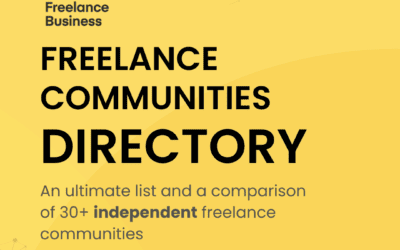We all have intense days, no question. Covid, war, energy crisis, inflation, etc. That’s why I’ve dedicated the autumn months to talking to as many people as possible, gathering as much information as possible, and seeing and studying as many situations, businesses and areas as possible.
All this in order to better understand what is going on in the world today, how the future of work looks like and what is the current state of freelancing globally and locally. In this article, I summarise my thoughts and experiences on this subject, spiced up with a good dose of inspiration.
I haven’t been bored in the last few months, but it’s been worth it. I’ve created a picture of where I am now, I’ve made a list of possible directions for the future and I’m building my life along those lines.
This is an opinion piece, focusing mainly on the world of work, and freelancers in particular. The insights are essentially subjective, reflecting my own worldview and understanding, but as you can see below in the List of sources, they are not without foundation. My aim is simply to continue to help freelancers, this time by confirming that you are on the right track!
What is happening in the world of work today?
We continue to make good progress on the future of work. In fact, we are moving faster and faster towards more flexible, mainly project-based working, with a much stronger role for location-independent, project-based professionals.
Although we are still in the exploratory phase, freelancers and clients, the tide is turning. We no longer have to proactively seek out the larger companies, but there is a growing interest and openness to freelancers, even from large multinational players. This is still less noticeable in many countries such as Hungary, but what goes around comes around.
Companies are looking for ways to find talent in this community and, once they have it, how to work with it. This has been noticed by consultancies and service providers such as CXC Global, Charipickers, MBO Partners or Open Assembly who are helping businesses in independent (contingent) workforce management and designing and enabling a new operating system for open talent.

Source: Open Assembly
It’s exciting to see more and better service providers emerging on the international market, each taking a small slice out of the changing world of work.
They are also needed for the trend to unfold. One example is Safety Wing, which offers insurance to digital nomads and remote teams. Meanwhile, they are building Plumia, the country on the internet. Or the Center for the Transformation of Work, their mission is to transform the work of a billion people by 2025. Or Gigged.ai who are using AI to help companies and independent professionals find each other.
The future of work: ‘Blended teams’
I’ve come across the term “blended teams” a lot in recent months, which (like freelancing) has a myriad of definitions, but this is what I mean by blended teams: a mix of permanent workforce (employees), flexible workforce (freelancers) and technology (software), with the aim of finding out how they can work together to form a powerful team.
It’s the future, everyone knows that, but we are still at the beginning of the journey, good practices are being born now, in these years. For me, as a freelancer, the bottom line is that there will be a growing need and demand for freelancers, for excellent professionals who can work independently, on their own schedule, on a project basis and who can manage the ebb and flow of life and the administrative burden.
An interesting example is Airbus, who presented at Freelance Business Month 2022. For example, they have identified the most relevant and best online job sites for them, where they have a good chance of finding excellent professionals, mainly in engineering and technology. They are working closely with these platforms and are also investing a lot of energy within the organisation to find the most effective ways to integrate freelancers.
To sum up: we are making good progress, there is a clear, reserved place for freelancers in the future of work.
What about online work platforms?
Online job sites continue to proliferate, with countless job-search sites springing up (and many disappearing), where different companies are looking for different professionals on a project basis. Some are local, some are global. Some focus on one specialism, others on all. They mostly operate on a commission system, i.e. they put X percentage on each project, which they deduct from the project fee.
Which was a challenge 10 years ago when I was a trainer at Elance (now Upwork), where such a platform positions itself. Most of them are kind of midfield. You can find professionals of all skills, experience and nationalities. The biggest ones are still Upwork, Freelancer.com, Fiverr and Guru.
And on Flexjobs you can find almost anything, from remote, hybrid full-time and project-based freelance jobs anywhere in the world.
Distributed, Topcoder or Torc, on the other hand, already filters applicants thoroughly. It’s not easy to get in, you have to be really good. But if you do, you can expect steady work and an above-average salary.
There are also some exciting smaller players, such as Mayple, which recruits marketers or The Indie list, who provide easy access to hundreds of highly experienced freelancers, contractors and consultants in Ireland.
If you’re interested in other platforms, here’s a good list. And don’t forget to subscribe to a notification once we are done with the Freelance Business Platforms Guide!
A good community is the basis for everything
What’s most important not only for the trend, but also for us freelancers, are good communities. Where you can learn from each other, get inspired and grow. I have seen excellent international examples of this, such as the Dutch Qommunity, or Freelancing Females, Betoobe and of course the Freelance Business Community!
Super communities are also being built around coworking, and the Coworking Assembly is trying to bring European offices together and support them. In other related areas, such as startups. I have seen many good international examples of REAL community building (a community is not just a network, but a network of members in dialogue, and community building is about facilitating this).
I was most impressed by the Draper Startup House, whose mission is to connect and inspire one million entrepreneurs by 2030. To do this, they are now closely connected with nearly 30 coliving and coworking spaces around the world, some of which they run themselves. My other favourite is Startup Madeira, who are building an entrepreneurial ecosystem across the island, involving all actors (accommodation providers, coworking spaces, municipalities, startups, etc.).
Freelancers worldwide
Let’s start with the big picture first. Freelancers are everywhere in the world and their numbers are growing dynamically. There are fewer and fewer boundaries, geographically and by definition. For example, more and more people are travelling, even relocating their headquarters to another country or continent for longer periods of time, and we now call them digital nomads.
But this is also an increasingly blurred category, with very few people who travel not only intermittently but also for life, for years or decades. The majority travel for 1-2 years at most, changing location every 3-6 months.
But the most common, and they don’t consider themselves digital nomads, are those who occasionally (e.g. every 2-3 years) take a trip and go away for 1-6 months. Or they are stargazing around the world, travelling several times a year for 2-4 weeks, working in between, but they have a fixed base to which they return regularly and spend most of their time.
We also have very similar challenges everywhere: getting and keeping clients, pricing, administration. Anyone who is just starting out as a freelancer, regardless of nationality or place of residence, has to deal with the ups and downs of freelancing. One day you have lots of clients, lots of income, the next day nothing. Sometimes you get a good client and you can work with them for a long time, sometimes you miss the mark. Sometimes you price yourself well and you are satisfied, sometimes you are very unlucky about what you have to deliver and for how much.
I’ve spoken to a South Korean graphic designer living in Melbourne, a Colombian developer moving to Argentina, a girl from California currently ‘stationed’ in Croatia and a British girl building a digital nomad community in Cyprus. There is nothing new under the sun, everyone faces similar challenges, each country has its own problems, whether in their home country or in their chosen temporary home.
Which way is forward? A guide to 2023.
Whether you’re a practising freelancer or just interested, I want to reassure you that this trend has been and will continue to be worth keeping an eye on.
A guide to 2023:
1) Develop the skills you need to freelance!
Self-awareness, self-development, creativity, flexibility, responsibility, autonomy (e.g. in working, decision-making, goal-setting), openness, results-orientation and adaptability. These skills can be developed and will benefit you whatever your future holds.
It is no coincidence that self-awareness and self-development are the first two areas. They are also important as employees, but as an entrepreneur, I don’t think anyone can be successful in the long term who doesn’t pay enough attention to them. Take care of yourself, physically, mentally, spiritually and professionally. No one else will do it for you. You have to take control of this and put it at the top of your priorities!
Alongside it all, build yourself a multi-element relaxation, stress management toolkit. Ergo know how you operate, recognise when you are overwhelmed, when you are close to burnout. Practice relaxation, de-stressing, re-energising well. Try more things and incorporate them into your life. Be sure to include exercise, something you like (walking can be an option).
Some ideas, these work for me:
- 4 day work week, I don’t work most Fridays. I’m a mother of two, when I’m not serving clients, I’m serving family. Friday is my day – well, not all of it.
- 1x massage a week (Friday morning at 9am, so I don’t start to work).
- 1x a week, ideally on Monday evening a cardio workout (running, intense gymnastics, cycling). Better with a trainer, in a group, it’s harder to doze off.
- 2-3x a week, 10 minutes of gymnastics in the morning (yoga style, stretching at its core).
- Digital detox in the evening and on weekends. I don’t work, don’t check email, often don’t even turn on wifi on my phone. There are some exceptional occasions when I break this, but mostly I stick to it.
- Reading regularly, mostly before bed.
- Eating a healthy, balanced diet (5 times a day, with lots of vegetables and fluids).
- At least one long trip a year, complete rest (10 days/2 weeks).
- In addition, regular excursions, shorter trips (if possible without work).
- Pre-planned days and weeks off, especially in summer. What’s not on the calendar won’t happen.
2) Start digesting and, over time, accept the rules of entrepreneurship.
It’s good to know what freedom, the number one attraction of freelancing, really means. Beyond the icing on the cake, you are responsible for a lot more as an entrepreneur than as an employee. Who you work for, when and how you work, how you allocate your time and resources. You are responsible for the administration of your business, the finances, the work of freelancers and subcontractors working for you.
And, of course, for the quality of the work you do. If you don’t hit the mark, you won’t get a referral, so you lose the opportunity that brings you 90% of your clients. Yes, referrals are still everything and I hope that doesn’t change.
As a freelancer, as a self-employed person, it is so much easier that if you make the wrong decision, the consequences are mostly suffered by you and possibly your family. If you are building a larger business and have employees, it is a different story.
Being an entrepreneur, including freelancing, is full of ups and downs. There are successful periods and less successful ones. Sometimes you have to take one step back, sometimes ten, sometimes you have to start from scratch. Anyone who can’t handle that, who collapses at every difficulty or failure, is not cut out to be an entrepreneur.
But if you feel that you do have entrepreneurial blood in you, but you haven’t taken the obstacles lightly, don’t give up. It’s something you have to learn and get used to. The ups and downs won’t, but the fear of them will pass. I’m finding that I’m starting to enjoy it myself. The first setbacks and failures have brought me down to earth, now I just shrug when things don’t work out the way I wanted them to. That’s life, especially for entrepreneurs.
3) Step onto the international stage!
The world is big. I can’t explain it in more platitudes than that. Do you speak and write English fluently? If not, start learning very quickly. If you do, start opening up to foreign clients.
Please don’t be afraid of this, being small is just a bad habit. Working with foreign clients is getting easier, more open and more opportunities. Thousands of online job sites make it easy for you, and believe me, you have enough skills, whether you are a beginner or an experienced professional, there is a demand for everything. And in such a rapidly changing economic environment, it is worth trying to add at least one foreign or international project to your portfolio.
Not speaking perfect English only matters if you are an interpreter or translator. Although there is a loophole for the latter, translation softwares are getting better, try DeepL. If you are unsure about your language skills, don’t delay, start improving. There are plenty of free options.
Where to start? Online job sites are a good place to start. Based on the projects available on these sites, choose three that appeal to you and match your skills. Register and start applying. You won’t succeed at first, but if you put in the time, effort and attention to understand how these platforms work, you’ll get your first project sooner or later. After the first gig it will be a notch easier.
I think of Petra, who lost her job during the pandemic, working in one of the big 5* hotels in Budapest. Interested in freelancing, she started trying her hand at Upwork, following the guidance of articles on FreelancerBlog. Within a short time, he landed her first client, a cruise line, for whom she helped to write pandemic rules. After that, she was involved in several similar projects, and today she is building her own startup, ClicknCruise.
The other important thing you need to do is to upload and actively use your LinkedIn profile (practical advice in this video). A surprisingly large number of people use it, in fact everyone I have come into professional contact with recently. They are actively posting (in English) and constantly expanding their network of contacts using LinkedIn (too). While it may still make sense to use Facebook and Insta here in Hungary for personal branding and professional connections, it doesn’t make much sense west of Austria. The Meta Universe is becoming less and less appealing to many, its place is being steadily taken by invisible connections, communities, Messenger, Whatsapp and Telegram groups, private, invite-only Zoom meetings.
4) Join a community!
Join an entrepreneurial, freelance or startup community! But anything will do, just make sure you’re surrounded by cool people who you feel will push you forward, give you strength and energy, rather than the opposite. Family and friends can also be a good community, they often give you strength, but entrepreneurial mindset and inspiration not necessarily.
Where can you find entrepreneurial communities?
If you are looking for offline events, check coworking offices in your city, but there must be some other exciting initiatives. Keep your eyes open and keep trying. Go to a coworking or a selected company or community event, offline or online. It might not be for you, you might not feel comfortable, boom. Try a different one. What you should definitely not do is sit at home. Take yourself out of the grey day-to-day.
And first of all, make sure you join the mailing list of Freelance Business Community and Slack. For more guidance check our previous article: Freelance Communities: How to Choose One?
5) Plan for the very long term and the very short term, and be flexible about what’s in between.
I had difficulties with this point for a long time, but thanks to Covid, I’ve improved at an amazing pace in this area, I’ve even got a bit into it. But I’m much better at managing plans now, I think.
My recipe, which I recommend to you (well I’m not that smart, I read it in biographies of famous entrepreneurs):
A. Have a long-term vision, a vision that is simple to articulate. For YOU. Not for your business, you’ll adapt it to that.
Where do you want to be, what will your life look like in 5-10 years? What do you do, how do you spend your days, who are you surrounded by? What do people think of you, what image do you want to project of yourself?
I know many people say that the latter is not important to them, but that is simply not true. We are social beings, everyone has people in their lives, even just one, whose opinion matters.
B. What can you do TODAY to get closer to this vision? If you have plenty of time and capacity, you will move quickly. But most of us live a maximised life, and it’s hard to fit in extras. But one small step every day, over a period of years, can get you there.
Let me tell you my story: it’s been 10 years since I signed up for Elance (now Upwork), and that’s where my freelance career started. I was working full time, but I was attracted by the flexibility, so I started applying for freelance projects. I got my first one in a couple of weeks, followed by a few more, but the most exciting came after that.
Along with thousands of other users, I received the site’s call for trainers in 12 countries to help locals navigate the world of online work platforms. After a long selection process, I became their Hungarian trainer.
I was given access to a lot of research and it became clear to me that this is the future. Flexible, project-based working, especially in the intellectual field. I have been watching and studying for years and I have formulated a vision for myself, a somewhat elusive one at first, but a concrete one later: to support the trend of freelancing, to be an expert in this field and to introduce the freelance lifestyle to as many people as possible. Not just as a hobby, I want to do this for a living.
In 2017, I organised the first Freelancer Festival in Budapest, followed by other conferences, meetups and workshops. In 2018, I launched FreelancerBlog with my partners, which has become one of the most important players in the Hungarian freelance ecosystem and knowledge sharing. We tried and experimented with several things. I owe my current client base and income to this. The icing on the cake is the assignment as Marketing Director at Freelance Business Community which gave me an even better insight into the international market and trends.
It took me 10 years, but I achieved my goal.
If you’ve made it this far, I hope you found some useful, possibly inspiring ideas in this article. I wish you good luck on your journey! If you would like to share where you are or what you think about the above, please contact me on Linkedin!
And if you need more serious help with your business or idea, check out my 10 steps business planning framework.
List of sources
Finally, a quick inventory of where I got the information. Over the past few months, I’ve been regularly visiting coworking offices, talking to freelancers and entrepreneurs I know or don’t know. I have visited many offices in Hungary and this year I’ll also be checking out the Portuguese coworking offices in Lisbon, at one of the bastions of the coworking movement.
I have participated in several meetups, private roundtables, lectures and conferences in my home country and abroad, mainly on crisis management, startup life, the future of work, entrepreneurship, pricing, coworking, self-awareness and marketing. I followed the numerous presentations at the Freelance Business Month (FBM) in October and talked, had coffee and chatted with freelancers from home and abroad, from Melbourne through Buenos Aires to Cyprus.
I’ve also read books, deepened my knowledge of network science with Linked and The Formula by Albert-László Barabási. If you’re interested in coliving, I highly recommend Gui Perdrix’s The Art of Coliving. I have also got my hands on a book on resilience, although I have not read it, but I was inspired by The Four Agreements, and some Hungarian masterpieces.
I really like books because they are not easy to write, especially hundreds of pages, and they are not easy to sell. Another challenge with printed books is the costly printing and logistics. So anyone who undertakes this is either very good or has something very important to say to the world, so it’s worth listening to and reading their thoughts.
As Gergő Benedek confirmed in his presentation at Freelance Business Month, it is no longer the quantity of information available, but rather the quality that matters, and curation, the quality selection of content, is the strongest trend in content marketing. That’s why I also read printed books or longer articles from reliable sources.
Read books yourself!




